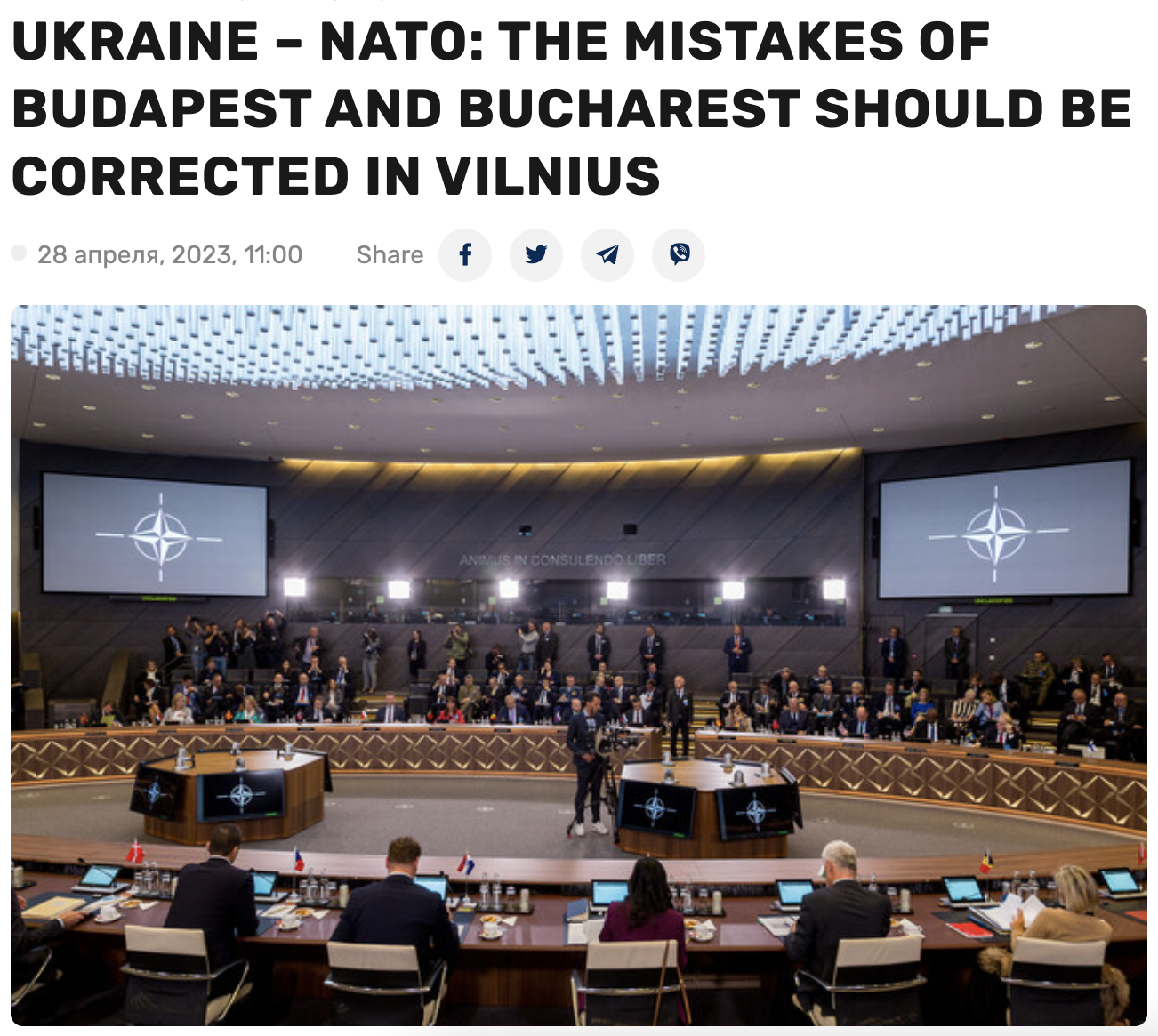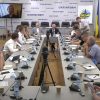
Analysis by Alyona Getmanchuk for ZN.ua
PDF-version of the policy brief is available via the link here.
With the rapid approach of the July NATO summit, it is becoming more and more obvious that Vilnius, representing the embodiment of a just world, should become an opportunity to correct the mistakes made in Budapest and Bucharest, and Ukraine should strive for this. After all, in order to understand the price of the mistakes of Budapest and Bucharest, it is enough to simply answer the question: would it have been possible for the Russian Federation to attack Ukraine if our country either still possessed nuclear weapons or had real security guarantees – whether from the USA, Britain or France. Would there have been a war on the territory of Ukraine if the exact provision and implementation of security guarantees, which would have been concluded within the framework of the Budapest policy, had been ensured. Would an attack by the Russian Federation on the territory of Ukraine be possible if our country were a member of NATO? It is very unlikely. The magic power of Article 5 of NATO or the security guarantees from the USA can be evaluated differently, but the fact remains that there are no cases in history when Russia attacked countries that are NATO members or countries that have bilateral security agreements with the USA.
Correcting the mistakes of Budapest is an offer for Ukraine of real security guarantees, not abstract and non-binding security assurances. Guarantees due to membership in NATO or temporary guarantees from a number of countries until the acquisition of this membership.
Correcting Bucharest’s mistakes is the end of the era of “strategic uncertainty” regarding Ukraine’s membership in NATO. For us, it is important not only to finally reach the destination, but also to lay a route to this point. Without the Membership Action Plan (MAP) and its new analogues, which are de facto trying to be created for Ukraine in some Western capitals as another substitute for the real process of joining NATO – instead of finally inviting Ukraine to the Alliance and launching the appropriate accession process despite ongoing hostilities. One must be very careful with the argument that it is impossible to start the process of Ukraine’s accession to NATO while military operations continue: it can turn into a kind of trap. Those who support and promote such an idea are actually encouraging Putin to develop a scenario in which military action in one form or another will last for years, if not decades.
The mistakes of Budapest and Bucharest cannot be corrected in Vilnius without a political request to receive an invitation to join the Alliance and start accession negotiations with Kyiv, and the political courage (here we are not even talking about political will) to satisfy this request on the part of the countries that belong to NATO. After long discussions, it seems that the Ukrainian authorities have formed a position, which consists precisely in seeking in Vilnius an invitation to membership and the provision of temporary security guarantees to Ukraine from a number of countries that are members of NATO for the duration of the actual accession process. The crystallization of this position became evident at the joint press briefing of the Secretary General of the Alliance Stoltenberg and the President of Ukraine Zelenskyy, who thanked him for the invitation addressed to him to attend the NATO summit in Vilnius. However, Zelenskyy emphasized at the summit that it will be much more important for Ukraine in Vilnius to have an invitation for it to join the Alliance, as well as a proposal for temporary security guarantees.
Despite the fact that the scenario of inviting Ukraine to NATO already in Vilnius looks unrealistic, Kyiv has no right to a different position. First of all, you cannot get what you have not formally asked for. This expression applies especially to NATO. Ukrainian diplomats and experts, who have long and deeply cared about the topic of Euro-Atlantic integration, know very well how they had to repeatedly repent and regret after some partners initially asked Ukraine out loud not even to voice this or that issue, calling it “toxic”, “unrealistic” or simply “irrelevant”, and then they said in surprise: “But you didn’t ask for this and that.”
Secondly, Ukraine cannot take part in the Vilnius summit with a less ambitious goal than individual NATO member states, primarily the Lithuanians, the hosts of the summit, who have already de facto started a campaign in many capitals for Ukraine’s membership in NATO. It is worth noting that the blurred position of Kyiv made their work difficult, because in the capitals where there are many skeptics, regarding the Ukrainian issue, experts could always say: “Ukrainians themselves do not ask for invitations and temporary security guarantees.” And from the Ukrainian capital there really sounded blurred phrases of politicians about the need for a “political signal”, acceleration of the “implementation of the strategic course on integration”, and not about invitations to accession in general and accession negotiations in particular.
Thirdly, NATO has no documented restrictions on issuing an invitation for a country to join the alliance when military action is being taken against that country. Yes, there is a well-known document that explains the Alliance’s approaches to enlargement, namely the so-called Study on NATO Enlargement of 1995. This is the only document in which, in particular, it refers to the impossibility of accepting into NATO countries that have ethnic or external territorial disputes. Regarding Ukraine, it is fundamentally important not only that this document does not refer to a territorial dispute, but also that even in this study it is clearly and comprehensibly recorded that decisions regarding the admission of a particular country to NATO are made on an individual basis (on a case-by-case basis). In general, NATO as a military-political bloc was created as a post-war tool and designed for peacetime. Accordingly, all stages of its expansion also took place in peacetime, although many of them also took place during the Cold War. The fact that it has no experience of expansion at a time when war again reigns in the Euro-Atlantic space does not mean that such expansion should not happen in principle.
Fourthly, Ukraine, by and large, has nothing to lose if the question of inviting it to the international alliance in Vilnius is raised. Rather, our country may lose more if we do not raise this question. Kyiv’s demonstrative disregard of such a request can be interpreted not simply as an actual recognition of the Russian Federation’s right to veto the expansion of the Alliance and the recognition that Putin started the war against Ukraine precisely because of its desire to join NATO. In addition, such ignoring of this request may also serve as a signal that the issue of future membership in NATO may be considered in the Ukrainian capital as a potential compromise in possible future negotiations with the Kremlin.
Fifth, today Ukraine has not only the moral right to ask for an invitation to the summit: in contrast to the restless year of 2008. After all, now the level of interoperability – both military and political – with NATO countries is much higher, and in Ukraine itself there is a complete political and social consensus regarding the lack of alternatives to the movement towards the Alliance. On the eve of the Bucharest summit, there was still no such cohesion and purposefulness in planning a strategy for the country’s further development and movement, which at that time was actively used as one of the key counterarguments against the Membership Action Plan (MAP) for Ukraine by the top skeptics who were in power, primarily Angela Merkel.
As for the political will on the part of the Alliance, the main obstacle today remains the position of the United States of America, which has repeatedly made it clear in private and publicly that the issue of Ukraine’s membership in NATO is not on the agenda as long as the war continues. After all, today, they say, it is much more important to focus on short-term practical support for Ukraine to help it repel the Russian invasion, rather than on the process of joining the Alliance.
However, there are enough reasons to claim that behind the noble goal of short-term practical support, which we really need for successful counteroffensive actions, there is a great fear that the Russian Federation’s war against Ukraine will not become NATO’s war with the Russian Federation. And thus, inviting Ukraine to membership in this context is seen as inviting ourselves to war with Russia. However, if anyone is truly disinterested in Russia’s war with NATO, it is Putin himself. And who but he will do everything possible to prevent such a scenario. This needs to be talked about in Washington. In addition, one more thing that needs to be often mentioned and said is about the sentiments in American society in favor of Ukraine’s membership in NATO (this fact is confirmed by sociology), which Biden’s entourage likes to focus on so much.
Apart from that, Ukraine’s war cannot become a NATO war until Ukraine, in fact, joins the Alliance and Article 5 of the Washington Treaty does not apply to it. As the experience of joining the Alliance of countries such as Finland and Sweden clearly showed, even for impeccable candidates and following a super-fast procedure, the process of joining NATO does not happen overnight. Accordingly, based on the Alliance expansion procedure, even if Ukraine receives an invitation in Vilnius to join the international organization, it will still have to go through two important stages, namely the opening negotiations and the process of ratification of the accession protocols in the Alliance member countries. And it is unlikely that the introductory negotiations with Kyiv will last one day, as with Finland and Sweden.
In addition to the USA, there are at least two other countries that have signaled their unwillingness to offer Kyiv in Vilnius even some guidance and support on the question of membership in the Alliance, not to mention invitations and opening negotiations. Thus, strengthening another argument of Washington, namely the statement about the lack of consensus in the Alliance on the issue of Ukraine.
And here, obviously, skeptics will remark: why is it really necessary to raise questions so acutely in Vilnius regarding Ukraine’s invitation to the international alliance? Why can’t we talk about some more creative formats, a kind of manual book, where the necessary reforms for membership would be prescribed? Such an approach to solving the issue of inviting Ukraine to NATO would be a good upgrade of the Membership Action Plan (MAP). And at the same time, the political message of this initiative would be new, and our country would take a significant step forward on the way to NATO integration. In addition, this method would become an effective lever for reforms in our country… In general, this is a good idea, and we would be at the epicenter of new amazing political achievements. It is worth saying that the New Europe Center also promoted this approach, but all this was two years ago. Two things have changed dramatically since then. At that time, there was no lever of influence on reforms in the form of a candidate status in the EU, and even the European perspective looked like something unattainable. Today, we have this status, and with it a list of reforms that Ukraine must implement in order to first receive a decision on the opening of accession negotiations, and then to conduct these negotiations. Accordingly, Ukraine got the opportunity to make reforms with the EU. The only exception can be democratic and civilian oversight of the Armed Forces of Ukraine, which the accession process to the EU “does not cover”. Here, it will be important for Ukraine to demonstrate its commitment to this principle, but for this there are opening negotiations in NATO. It is there that reforms are discussed, which, if any, still need to be “finished” for membership in the Alliance.
Another difference is the fact of the full-scale invasion of the Russian Federation into the territory of Ukraine. If a few years ago it was still possible to appeal to the restraint of the actual process of Ukraine joining NATO due to the fear of escalation on the part of Putin, up to a military invasion. However, now, against the background of aggression that has been going on for more than a year in the most brutal and barbaric forms, even Henry Kissinger, a longtime opponent of Ukraine’s membership in NATO, has recognized the argument about a possible escalation as irrelevant.
For now, it is necessary to convince the USA by all available means that the beginning of Ukraine’s real accession to NATO is a way to end the war, not to expand it. And that the war will not be able to really end until Ukraine is a member of NATO, because the “strategic uncertainty” in this matter will constantly serve as a temptation for Moscow to attack Kyiv and somehow fix it in its imperially perverted coordinate system (if, of course, the USA will not decide to provide bilateral security guarantees for Ukraine).
Well, there are only two ways to Ukraine’s membership in the Alliance, namely the long and the short. It is worth noting that the White House does not deny Ukraine’s right to membership in the Alliance. The representatives of NATO have already tried to go a long way, and have reached exactly what was most feared in the capitals of the Alliance because of Ukraine’s Euro-Atlantic ambitions, namely a full-scale war in Europe. Now it’s time to finally muster the political courage to try to take a short cut.







